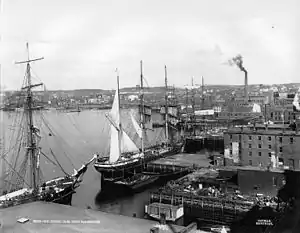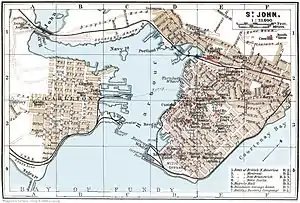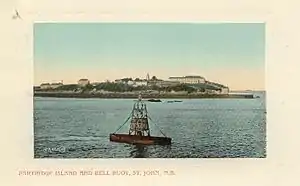Saint John Harbour
Saint John Harbour is a large natural harbour on the Atlantic coast of New Brunswick, Canada, located in the city of Saint John, New Brunswick.


Harbour description
The harbour includes the following geographic areas:
- Anthonys Cove
- Hazen Creek
- Courtenay Bay
- Round Reef
- Saint John River
Islands
The harbour is home to several small islands including:

Navigation
There are two large bridges crossing The Narrows:
- the Saint John Harbour Bridge
- the Reversing Falls Bridge, opening in 1970
Port facilities
The harbour is managed by the Port of Saint John.
Pollution and harbor cleanup
The Saint John, New Brunswick harbour cleanup infrastructure project brought an end to the routine discharge raw sewage into the waterways of Saint John, New Brunswick, Canada. The $99 million initiative[1] involved completing a third wastewater treatment plant in east Saint John, and diverting existing outfalls to it through lift and pumping stations.[2] The initiative received full funding from the municipal, provincial and federal governments in 2008 and the project was completed in 2014.[3]
Saint John previously[4] discharged 16 million litres of raw sewage into the Saint John Harbour and its streams every day.[5] The practice had been going on in Saint John since the mid-1800s. Although Saint John was not the only municipality in Canada that dumped untreated wastewater into its environment, it had been unique in that its outfalls once flowed into local streams, forming open sewers that ran through the center of the city.
Canadian guidelines suggest that waters with counts of greater than 200 fecal coliform bacteria per 100 ml sample are unsafe for human contact (such as wading, swimming, fishing, or swimming of pets).[6] Post-cleanup sampling conducted during 2014 along the lowest 400 m of the creek - which had historically received the greatest volume of untreated municipal wastewater - revealed decreases in faecal bacteria counts ranging from 95 to 99%, as compared to results from 2013. While as of 2014 the levels of bacteria still remained on average above the federal recreational water safety guidelines of 200 counts/100 ml at all sites tested, the substantial improvements in water quality have been encouraging.[7]
Previously, in several places Saint John's scenic Harbour Passage walking trail came close to outfalls that had contaminated the harbour with waste that was unsafe for human contact. A University of New Brunswick study had also found that fish in the waterways were contaminated by the raw sewage, making handling a human health risk.[8] Unsightly personal hygiene products (tampons, condoms, toilet paper, etc.) had sometimes been visible on beaches and hanging from the vegetation along the shoreline. Those outfalls were decommissioned as part of the cleanup project.
Shipwrecks
- Victoria[9]-
References
- www.cbc.ca Harbour Cleanup completion
- www.saintjohn.ca News release
- www.saintjohn.ca
- www.saintjohn.ca Project summary
- www.acapsj.com Project description Archived 2013-12-27 at the Wayback Machine
- www.acapsj.com Archived 2013-12-27 at the Wayback Machine
- www.acapsj.org Early cleanup results
- www.acapsj.com: Atlantic Coastal Action Program, Saint John
- , Sinks of the coast of Indiantown.
